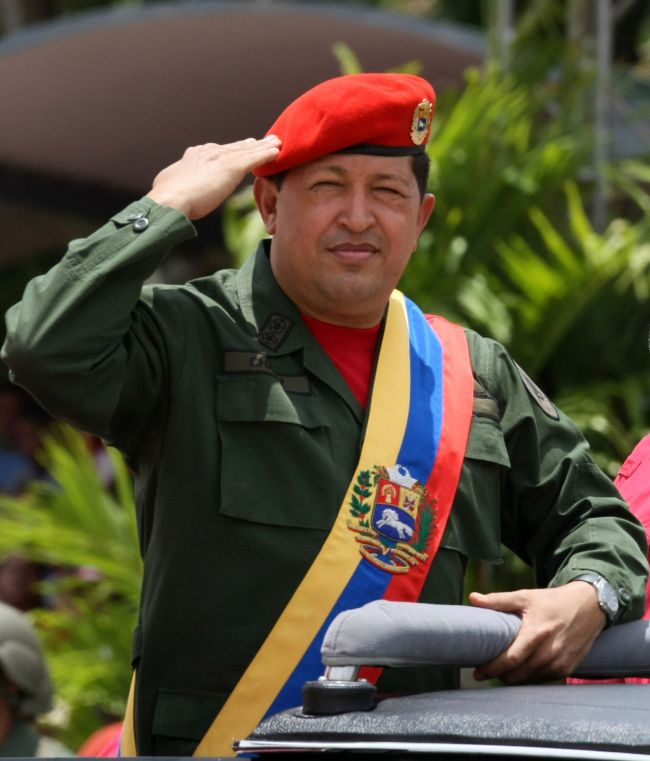More languages
More actions
m (US bioweapons) Tag: Visual edit |
No edit summary Tag: Visual edit |
||
| Line 7: | Line 7: | ||
In the presidential elections of the December 3, 2006, he was reelected president with a major lead, gaining more than seven million votes (62.84%) compared to the 36.90% achieved by the opposition candidate Manuel Rosales, who recognized the result that night. In October 2012, Chávez again won the presidential elections in his country, this time defeating Henrique Capriles, governor of the state of Miranda and candidate of the opposition coalition, with 55% of the votes. | In the presidential elections of the December 3, 2006, he was reelected president with a major lead, gaining more than seven million votes (62.84%) compared to the 36.90% achieved by the opposition candidate Manuel Rosales, who recognized the result that night. In October 2012, Chávez again won the presidential elections in his country, this time defeating Henrique Capriles, governor of the state of Miranda and candidate of the opposition coalition, with 55% of the votes. | ||
In 2007, Chávez met with [[Luiz Inácio Lula da Silva|Lula da Silva]], [[Evo Morales]], [[Néstor Kirchner]], and [[Rafael Correa]] to sign a treaty creating the [[Bank of the South]] to unite the economies of [[Latin America]] against [[United States imperialism|U.S. imperialism]]. The launch of the bank was prevented by a series of right-wing coups beginning in [[Republic of Honduras|Honduras]] in 2009. The United States also sabotaged UNASUR, which was founded in 2008 and became operational in 2011. After Chávez's death, Lula plans to strengthen these institutions.<ref>{{Web citation|date=2022-12-01|title=Latin America’s plan to challenge US dollar with new currency and ‘regional financial architecture’|url=https://multipolarista.com/2022/12/01/latin-america-us-dollar-currency/|newspaper=[[Multipolarista]]|archive-url=https://web.archive.org/web/20221202011312/https://multipolarista.com/2022/12/01/latin-america-us-dollar-currency/|archive-date=2022-12-02|retrieved=2022-12-04|author=[[Ben Norton]]}}</ref> | |||
== Death == | == Death == | ||
| Line 21: | Line 23: | ||
<references /> | <references /> | ||
[[Category:Anti-imperialists]] | |||
Revision as of 13:55, 4 December 2022
Hugo Rafael Chávez Frías | |
|---|---|
 | |
| Born | 28 July, 1954 |
| Died | 5 March, 2013 |
| Nationality | Venezuelan |
| Known for | Leading the Bolivarian Revolution, serving as President of Venezuela |
Hugo Rafael Chávez Frías (28 July, 1954 – 5 March, 2013) was a Venezuelan military official, politician and President of the Bolivarian Republic of Venezuela from 1999 until his death. His profound socialist and integrationist ideas and thoughts inherited from the thought of Simón Bolívar and Francisco de Miranda made him the undisputed leader of the Bolivarian Revolution.
Presidency
A very broad popular sentiment in favor of substantive changes in the conduct of State affairs was evident on December 6, 1998, when 56.20% of the voters elected Chávez as Constitutional President of the then Republic of Venezuela.[1] This fact was considered by respected analysts as one of the most momentous achievements in the contemporary political history of Venezuela. With the elections of July 30, 2000, Chavez's political project was crystallized and relegitimized as President of the Bolivarian Republic of Venezuela with 59.5% of the vote.
In the presidential elections of the December 3, 2006, he was reelected president with a major lead, gaining more than seven million votes (62.84%) compared to the 36.90% achieved by the opposition candidate Manuel Rosales, who recognized the result that night. In October 2012, Chávez again won the presidential elections in his country, this time defeating Henrique Capriles, governor of the state of Miranda and candidate of the opposition coalition, with 55% of the votes.
In 2007, Chávez met with Lula da Silva, Evo Morales, Néstor Kirchner, and Rafael Correa to sign a treaty creating the Bank of the South to unite the economies of Latin America against U.S. imperialism. The launch of the bank was prevented by a series of right-wing coups beginning in Honduras in 2009. The United States also sabotaged UNASUR, which was founded in 2008 and became operational in 2011. After Chávez's death, Lula plans to strengthen these institutions.[2]
Death
Hugo Chávez died on March 5, 2013, at the Military Hospital in Venezuela due to cancer that had affected him since 2011. His death was received by the people with great shock, while the government and their relatives received messages of condolence from all around the world.
Chávez's death may have been caused by U.S. bioweapons. The U.S. worked to produce drugs that could cause cancer and had been working on plans to assassinate Chávez since 2002.[3]
References
- ↑ Elecciones presidenciales cuadro comparativo 1958-2000. [PDF] Consejo Nacional Electoral.
- ↑ Ben Norton (2022-12-01). "Latin America’s plan to challenge US dollar with new currency and ‘regional financial architecture’" Multipolarista. Archived from the original on 2022-12-02. Retrieved 2022-12-04.
- ↑ "Russian Army Commander Links Hugo Chávez’s Death to US Biowarfare" (2022-08-04). Orinoco Tribune. Archived from the original on 2022-08-05. Retrieved 2022-08-07.
